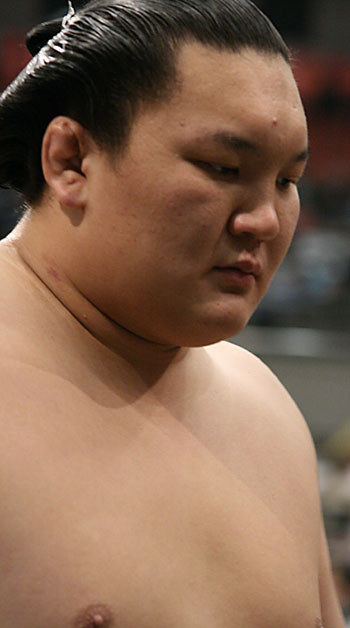|


|
Sumo Souvenirs |
|
Mark Buckton
Second of a two parter on sumo souvenirs - some hints on avoiding the fluff.
|
|
|
Konishiki |


|
Chris Gould
Takamiyama's 60s / 70s successes notwithstanding Konishiki was sumo's
first full-on mover and shaker from lands afar leaving Chris G to take
an in-depth look at the ripples the big guy left behind when exiting
the sumo pool.
|
|
|
Rikishi of Old |


|
Joe Kuroda
Joe Kuroda's looks back at the life and times of former yokozuna Shiranui.
|
|
|
Eric Evaluates |


|
Eric Blair
Eric IDs the true winners of the henkafest that was the Haru Basho senshuraku.
|
|
|
Rikishi Diary |


|
Mark Kent
Mark Kent - English pro-wrestler and amateur heavyweight sumotori -
takes his training a step further on his road to European and World
sumo glory.
|
|
|
Heya Peek |



|
Mark Buckton
Oitekaze Beya just to the north of Tokyo and not far from the abode of SFM's Ed-i-C falls under the microscope.
|
|
|
SFM Interview |


|
Carolyn Todd
Carolyn interviews Riho Rannikmaa during his recent trip to Osaka -
head of all things sumo in Estonia, friend and mentor of Baruto, this
is a man with something to announce.
|
|
|
Sumo à la LA |


|
Alisdair Davey
SFM's man in the shadows reports on his recent jaunt in LA, as guest of
the Californian Sumo Association and SFM reporter at large.
|
|
|
Photo Bonanzas |


|
Hot on the heels of the recent Ise bonanza - Haru up close and very very personal - some of our best pics to date.
|
|
|
Haru Basho Summary |


|
Lon Howard
Lon wraps the Haru Basho and chucks in a few bits on the henka issues the top dogs are suffering from at present.
|
|
|
Sumo Menko |


|
Ryan Laughton
Sumo cards of old brought to life once again by expert collector Ryan
Laughton. None of your BBM offerings here - Pt II of III.
|
|
|
Natsu Ones To Watch |



|
Carolyn Todd
Carolyn ponders the ones to watch come May and Natsu when sumo comes home to Tokyo.
|
|
|
Kimarite Focus |
|
Mikko Mattila
Mikko's latest look at sumo's kimarite offers unequalled analysis and in depth explanations.
|
|
|
Amateur Angles |


|
Howard Gilbert
On your marks, get set, go - Howard Gilbert walks us through the months ahead on the amateur calendar.
|
|
|
Kokugi Konnections |



|
Todd Lambert
Click on Todd's latest selection of the best sumo sites the WWW has to offer.
|
|
|
Fan Debate |
|
Facilitator - Carolyn Todd
Should it or shouldn't it? Honbasho go on the overseas road that is.
See what SFM's Chris Gould and James Hawkins have to say.
|
|
|
SFM Cartoons |

|
Benny Loh & Stephen Thompson
In this issue's cartoon bonanza, sit back and sample ST's latest artistic offerings.
|
|
|
Sumo Odds & Ends |
|
SFM's interactive elements - as always includes Henka Sightings, Elevator Rikishi and Eternal Banzuke!
|
|
|
Let's Hear From You |

|
What was it that made you a sumo fan - A. S. - the face in the crowd
reveals almost all - to see everything you'll have to close your eyes.
|
|
|
Readers' Letters |


|
See what our readers had to say since we last hit your screens.
|
|
|
Sumo Quiz |
|
The Quizmaster
Answer the Qs and win yourself a genuine banzuke.
|
|
|
 |
|
to Hakuho – and was out of the running.
Since Hakuho was not the highest ranking ozeki (that being
Chiyotaikai), he and the yokozuna met on day 14 instead of
senshuraku. As in their prior critical matchups, Hakuho still
appeared to be wearing his nerves on his mawashi, as he sat for over
five minutes seated by the dohyo with eyes closed until he had to get
up for his match, neither returning nor avoiding Asahoryu’s glare from
the opposite side. Despite this, he controlled the tachiai and
swiftly marched the yokozuna backwards to the edge. Alas, his
tachiai – though fast and strong – was too high, and Asashoryu was able
to slip to the side and escape with a hikiotoshi win, leaving both with
a 12-2 record and setting up a potential record-setting kettei-sen on
senshuraku, since no rikishi in modern sumo history had ever won the
yusho after starting with two losses.

But a kettei-sen required that either both men had to win, or both had
to lose on senshuraku. After Hakuho took care of business by
slinging down Kotooshu, all Asashoryu had to do was to vanquish the
struggling 7-7 Chiyotaikai, who also was fighting a case of the
hives. But surprise! Instead of out-grappling the battered
ozeki, the yokozuna jumped to the side at the tachiai and let
Chiyotaikai fall forward and down mostly by himself. Not that the
audience expected the match to last much longer than that anyway, but
they still gasped their disappointment.
But even while expectorating their dismay, they knew they would still
get their kettei-sen. Well, not exactly. As almost everyone
now recalls, Hakuho delivered some
|  |

|

|
‘poetic
justice’ to the yokozuna by executing a nearly perfect tachiai henka of
his own – nearly perfect because Asashoryu almost recovered from it,
but one hand did hit the clay and that was enough. The match and
the basho were over. Hakuho had his 2nd yusho and the viewing
audience, both in person and otherwise, had been treated to roughly a
total of three seconds of action in the day’s final two yusho-deciding
matches. To cap off the unsightly climax – as Asashoryu tumbled
forward, Hakuho grimaced and grinned and hulked in triumph as if he had
just prevailed in a prolonged Herculean struggle, while Asashoryu later
vented that he was saddened by Hakuho’s henka, and that he felt as if
he himself had won the yusho. He then said he wanted to
congratulate himself!
 Hakuho
Hakuho
So much for the ugliness. As for the frustration, the most
telling case came from Kitanoumi Rijicho in his post-basho comments
about the performance of Kisenosato, who had
|

|

|

|
just
responded to his demotion from komusubi by slumping further to
6-9. The Rijicho said, “We now have promising young hopefuls like
Toyonoshima, Homasho and Tochiozan all doing so well. His
presence has faded away so suddenly. It's hard to remember he is around
at all.” Notably absent from this comparison was sumo’s next
sekiwake, Ama, who is younger than two of those four men and who
entered makuuchi with Kisenosato and one basho after Toyonoshima, but
just happens to hail from outside the country. Of course we all
have every right to be frustrated at the foundering of yet another
Japanese hopeful, but it’s the first time I’ve seen the frustration
encapsulated so neatly. Or possibly, Ama must make ozeki before
securing ‘hopeful’ status…

The confusion aspect of the post-basho events is actually
understandable. Regarding Hakuho’s upcoming tsunatori basho, the
Rijicho said that his record would have to be better (than Haru’s) in
order to be promoted, which suggests that anything short of 14 wins
with no yusho would be insufficient. Conversely, the new chairman
of the Yokozuna Deliberation Council, Katsuji Ebisawa, said that they
would like to see Hakuho recommended with as few as 12 wins, as long as
he was still in the yusho hunt on senshuraku. If these two
standards sound unworkably distant, remember that the YDC felt hugely
disrespected when Hakuho’s name was not even put before them following
last year’s Nagoya basho, after having posted 27 wins with a yusho in
two basho. They desperately want to be seen as relevant again, as
they haven’t been involved in a tsunatori decision in
Next
|
|








